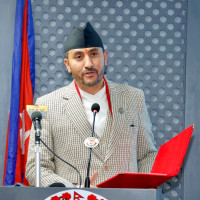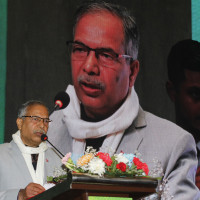- Monday, 19 January 2026
Making Right To Food A Reality
Nepal's food systems are a story of contrasts, where lush fields and rich traditions coexist with harsh realities of hunger, malnutrition and even rising obesity. Despite progress, the nation’s vulnerability to climate extremes, natural disasters and global upheavals like the Russia-Ukraine war continues to shake its foundations. From the terraced farms of the hills to the bustling markets of the Tarai, Nepal must reimagine its food systems not only to secure the future of its people but also to uphold its promise under the Sustainable Development Goals (SDGs). With every passing moment, Nepal’s transformation becomes less a choice and more an unavoidable obligation.
Globally, over 690 million people experience hunger, while 2 billion adults are overweight and 462 million remain underweight. In Nepal, the 2024 Global Hunger Index (GHI) ranks the country 68th out of 127 nations with a score of 14.7, reflecting a moderate level of hunger. This is a significant improvement from the alarming score of 37.4 in 2000, which classified Nepal’s hunger as “alarming”. Yet, these numbers, though encouraging, demand further action. Despite the legal guarantee of food as a right under the Right to Food and Food Sovereignty Act 2018, implementation remains weak due to regulatory gaps, weak coordination mechanisms and under-resourced local authorities.
Sustainable food system
Recent discussions highlight that "food regulation must be central to strengthening the food system," with calls for nutrition interventions to evolve into a broader movement focused on women, children and private-sector collaboration. This urgency underscores the need for a paradigm shift in how food governance is structured and implemented. Achieving a just, resilient and sustainable food system is critical for meeting the SDGs by 2030. Recognising this, the government of Nepal, through the UN Food Systems Summit 2021, identified six national pathways for transformation. Robust food governance requires aligning policies across agriculture, nutrition, education, health and economic sectors. Empowering youth and marginalised farmers is essential to ensure sustainable and equitable food production.
Despite constitutional mandates to ensure food security, weak coordination and underfunded local governments impede progress. Strengthening these linkages and streamlining budgets for local authorities is vital to turn policy promises into tangible outcomes. A well-regulated food system must monitor quality, reduce waste and promote healthy dietary choices. Here, the role of public education and community-driven initiatives cannot be overstated. Promoting nutritional literacy, boosting breastfeeding practices and reducing the dependency on processed imports are critical measures.
Experts argue that “promoting millets and other indigenous crops is crucial to nutrition and food system transformation,” as these crops not only offer nutritional benefits but also revive Nepal’s agricultural heritage. Resilience can be built by reviving indigenous food systems, conserving biodiversity and adopting agro-ecological practices. Local seed banks and climate-adaptive crops empower communities while enhancing sustainability. Investments in agricultural research and innovation are key to diversifying Nepal’s food systems and strengthening the backbone of local economies. The promotion of entrepreneurship, particularly among women and youth-led small and medium enterprises (SMEs), is pivotal in building equitable food value chains.
Expanding market access, improving financial inclusion and boosting agro-processing units can transform the economy while ensuring the resilience of rural communities. Given Nepal’s susceptibility to climate shocks and market disruptions, long-term investments in irrigation, storage facilities and early warning systems are essential. Mountainous and flood-prone regions need comprehensive strategies that blend emergency preparedness with structural resilience-building measures. The National Food Council was envisioned as the linchpin for food system transformation, yet its potential remains untapped.
While landmark judicial cases have affirmed the state’s obligation to guarantee food rights, grassroots implementation continues to fall short. Establishing clear mandates, activating the Food Council and holding governance structures accountable are necessary steps for true food sovereignty. Real change depends on political will, empowered local governance and grassroots mobilisation. Local governments need clear mandates, technical capacity and adequate budgets. Civil society, farmers’ federations and youth networks must be central to decision-making, not just passive beneficiaries.
Modern innovation
Nepal’s transformation must honour local control, recognise food providers and resist corporate dominance. Blending indigenous practices with modern innovation can create a system that is both resilient and culturally resonant. Agriculture contributes 27 per cent of Nepal’s GDP but employs over 60 per cent of the population, highlighting the sector’s critical role and untapped potential. According to UNICEF, nearly 35 per cent of children under the age of five suffer from chronic malnutrition (stunting), a stark reminder of the work still needed to secure nutritious diets for all. Moreover, Nepal’s 73rd rank out of 113 countries in the Global Food Security Index 2023 further emphasises the urgency for reforms in affordability and resilience.
With clarity in direction, Nepal must boldly execute pending regulations, invest decisively in agro ecology, and empower local communities to assume the mantle of rights-holders. Parliament must insist on accountability, the media should amplify food justice narratives and communities must mobilise for lasting change. Food is not a gift, it is a right imbued with justice, dignity and sovereignty. As Nepal continues to make strides from an 'alarming' to a 'moderate' hunger level, the challenge is ensuring reliable access to nutritious food for all. Food system transformation demands more than bureaucracy; it requires a human-centred approach. With sustained effort and a united front, Nepal can truly make the right to food a living reality.
(The author is associated with Rural Reconstruction Nepal (RRN). bhanu.parajuli@gmail.com)














